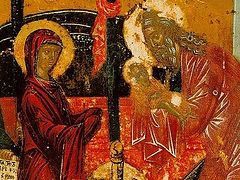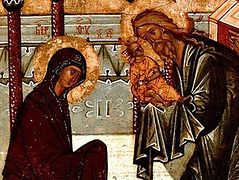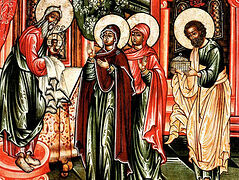 Archimandrite Vasile Vasilache Archimandrite Vasile (Vasilache) was born on January 29, 1909 in Romania to a pious family. Both his father, a priest, and his mother were from a long line of priests’ families. From 1921–1929 he studied in the Huși seminary, from 1929–1933 at the Bucharest theological department, and from 1933–1936 in the doctoral program of the Chisinau theological department, where he defended his dissertation on the theme of “Preaching in the Middle Ages”. In 1936 he received the monastic tonsure in Neamț Monastery, where he was ordained a hierodeacon and then a hieromonk, and then served in the Iasi Metropolitan Cathedral. In 1940 he was transferred to Bucharest, where he became an archimandrite, secretary to Patriarch Nicodim, and preacher at the Patriarchal Cathedral, from which his sermons were broadcast by radio for the entire country. Here Fr. Vasile gave over 400 sermons.
Archimandrite Vasile Vasilache Archimandrite Vasile (Vasilache) was born on January 29, 1909 in Romania to a pious family. Both his father, a priest, and his mother were from a long line of priests’ families. From 1921–1929 he studied in the Huși seminary, from 1929–1933 at the Bucharest theological department, and from 1933–1936 in the doctoral program of the Chisinau theological department, where he defended his dissertation on the theme of “Preaching in the Middle Ages”. In 1936 he received the monastic tonsure in Neamț Monastery, where he was ordained a hierodeacon and then a hieromonk, and then served in the Iasi Metropolitan Cathedral. In 1940 he was transferred to Bucharest, where he became an archimandrite, secretary to Patriarch Nicodim, and preacher at the Patriarchal Cathedral, from which his sermons were broadcast by radio for the entire country. Here Fr. Vasile gave over 400 sermons.
In 1948, Archimandrite Vasile (Vasilache) was appointed abbot of the Antim Monastery in the capital city, where under his aegis the famous “Burning Bush” (“Rugul Aprins”) movement was formed, uniting the leading intellectuals and spiritual leaders of the nation. In 1948 the movement was banned, Fr. Vasile was removed from the position of abbot, and exiled from the capital city. For a long time he was unable to find a place to serve and only in 1949 did he become the abbot of the Protection Skete. Nevertheless, on Pascha, 1959, an edict was published exiling him from the Skete, and in the same year he was arrested and sentenced to eight years imprisonment. He served his term in the harshest prisons of Romania. In 1964 he was released at the general amnesty of political prisoners, but was hardly able to find a position as a simple rural priest.
In 1969, at age sixty, he was invited by the Romanian diaspora to the USA, left for the West and became a vicar bishop of the Romanian Archbishopric of the USA and Canada. He served in those countries at various parishes for thirty-four years until his death, including the final nineteen years in the St. Nicholas Church in New York City, which he himself founded. In 1996 the eighty-seven-year-old elder was invited to visit his homeland, Romania, where he was given the right to wear a miter, archbishop’s mantia, and staff. He departed to the Lord in the ninety-fourth year of his life, on January 6, 2003.
Fr. Vasile (Vasilache) made a new translation of Holy Scripture; thirty-eight of his books have been published in Romania, and eleven abroad.
***
Brother Christians, I think that there isn’t a single person among those living on earth who would not reasonably consider that the Universe with its entire planetary system and the whole cosmos exist for none other reason than for the sake of human life. If there were no people, there would be no sense in the universe existing, there would be no one for it to show its beauty and generosity, no one to swim in the flow of the sun’s rays and dig the dew that brings forth a hundredfold fertile seeds, the velvety blanket that covers the earth.
For whom, do you think, all this harmony of beauty and abundant fruits would pour out if not for man, the king of all nature; who would retain the balance of all that exists on earth, bring order into it and reign in this kingdom of the universe?
Fear and trembling seize my mind when I only think of what the universe would be without man. A desert… a kingdom of wild nature, a reign of beasts, an abyss of all abysses… But mainly, we would not be able to explain to ourselves: For what then did God create the universe? For the animals, who are ready to tear each other apart, whose gaze is fixed on the earthly, and never upon the beauty of the cosmos?
The existence of the cosmos without man would speak of a creation of the universe without any intelligent reason; and that would mean that it was the product of chance. But even the simplest reasoning cannot allow that chance produced this grandiose cosmos from nothing—after all, “Nothing can come from nothing”, and chance is nothing more than a word, deprived of all meaning and power, unable to explain anything. Thus, the absence of man poses the problem of the absence of the cosmos.
Brothers, if for every mortal born on earth the entire cosmos and the whole universe exists for the sake of man, then for every Christian, the bodies and lives of all people exist for their common life with God in a life filled to abundance with infinite blessings, and for the glorification of God. Just as on earth we meet people, so in heaven we will meet God. A Christian must glorify and give thanks throughout his life to God, and consider Him the main goal of his life—not because He needs our laudations; after all, we do not increase His glory by them even a whit—but because He is powerful to embody and possess true blessedness, which we so long for.
Thus is explained the existence of the universe for every Christian. The cosmos has no sense in existing other than to be man’s abode, and man abides on this earth and can be happy in no other way than in expectation of the Meeting of the Lord, for which every Christian thirsts, as inexpressibly great consolation and bliss.
Brother Christians, we are in this earthly life only for a time of learning, which we go through in order to acquire the future life, to which we go whether we want to or not. This life is a time of learning in school, when we prepare ourselves for the great examination that we will have to take when we meet the Lord at His Second Coming. Then it will be revealed whether we were diligent students in the school of this life, or were idlers and disobedient— for which we will rightfully deserve all contempt and punishment.
Our earthly life is a chain of tests and trials, through which our soul is clearly revealed. By looking at whether a Christian lives by the truths of his faith here on earth, we can conclude whether he dedicates himself to a blessed life for eternity, or to torments without end. Life on the other side of the grave is given based upon how you valued this earthly life. This is why we are required to prepare ourselves with all sanctity to prepare to meet God in His Second Coming, when He rewards each according to his deeds.
This faith that life does not end with death, and hope that in the future life will be a just reward to each according to his deeds, cannot be torn from our hearts by any economic plans or even by force. However, the matter of how we prepare ourselves in this school of life is much weightier. Who prepares us for this examination on eternal life? Who is our educator? After all, if we live according to our own will, there can not only be no talk of ascent to blessedness, but even worse, we move in the opposite direction—to our own fall, a descent into zoolatria (deification of animals), or at “the highest”, to the deification of our own passions.
Brothers, the Teacher of our lives is Christ. God not only created us and gives us eternal life, He also guides us so that we would attain eternal life. In Christianity, we are given a teaching that is holy, God-revealed, and saves us. For us God is not the author of some geometric truths. He places in man’s heart the law of life, and if we follow it, it will bring us a reward of eternal blessedness.
Christ does not force this law of blessed life on anyone. As the supreme Teacher of mankind, He waits: Do we want to follow His counsel or not, as He Himself said in Holy Scripture: I call heaven and earth to record this day against you, that I have set before you life and death, blessing and cursing: therefore choose life, that both thou and thy seed may live (Deut. 30:19).
As soon as we depart from divine laws we begin to make mistakes. But whoever hears and fulfills the sacred teachings becomes pleasing to God. And this means that he will begin even in this life to come closer to Christ, until the time comes for him to live eternally with Christ in perfect blessedness.
Brothers, whoever lives already in this life with Christ will become a new creature. We see an example with Zacchaeus the publican, who at the moment when Jesus entered his house changed, and from a man filled with sins he was transformed into a righteous, merciful man, meaning a man who loves his neighbor and honors God.
We obtain closeness to God in Holy Communion, in hearing and fulfilling sacred teaching. When we begin to greedily absorb Christ with the gaze of our souls, we also change according to the image our Beloved One gave to us in His teachings. And then, I assure you, we will be truly prepared to meet the Lord at the Last Judgment—because we will approach the end of our earthly life like the prophet Samuel. This Old Testament saint, an ascetic laborer and man like us, who reached deep old age, stood amidst the people of Israel whom he ruled from a young age, and said to all:
“And now, behold, the king goes before you; and I am grown old and shall rest; and, behold, my sons among you; and, behold, I have gone about before you from my youth to this day. Behold, I, answer against me before the Lord and before his anointed: whose calf have I taken? or whose ass have I taken? or whom of you have I oppressed? or from whose hand have I taken a bribe, even a sandal? bear witness against me, and I will make restitution to you.”
And the people answered Samuel:
“Thou hast not injured us, and thou hast not oppressed us; and thou hast not afflicted us, and thou hast not taken anything from any one’s hand.”
And Samuel said to the people:
“The Lord witness among you, and his anointed witness this day, that ye have not found anything in my hand.”
And the people said:
“Witness!” (1 Kings 12:2–5 [Septuagint]).
And now I ask you: Could the elders of our people, could they ask the people to witness to them, as the aged Samuel did? Could each of us, like Samuel, receive witness to our innocence, which he then confirmed by an oath? If our elders, with but a few exceptions, could not ask us to witness to their innocence, then why should we be surprised that there is no happiness in our country?
Let us ascend the years step-by-step concurrently with the steps of the virtues; there is no culmination of years, no culmination of the virtues. Brothers, may each of us be wiser, looking at the sinless image of the life of Prophet Samuel, who to deep old age walked the path of truth, righteousness, and sanctity. And so, we will be not only honored by people, but we will be prepared in soul in unspeakably great blessedness to come out and meet the Lord, shining by our unspotted life, ready to be crowned by Him with the greatest heavenly rewards.
May we be made wiser by the story of the elder Symeon and Prophetess Anna to lead a life filled with piety and righteousness, as lived these two elderly people, who were worthy not to see death until they saw Christ the Lord (cf. Lk. 2:26).
If we study life from these brilliant teachers, then I assure you that we will become as pleasing to God as them—blessed both here and in the life to come; and when we see the Lord at the Last Judgment, He will meet us with an inexpressibly great reward.
Brothers, we must also prepare our souls in this life, so that our blessedness would be true and complete. Christian, I note, and you all note, that none of us wishes ourselves evil. Who would want an evil wife, with whom it’s impossible to live a happy and peaceful family life? Or who would want an indecent husband? Who does not take care to have good servants, good land, good work, and a good house? (Blessed Augustine, Homily 72).
And I also ask you, Christian: When we begin to talk about the life of your soul—do you want to have a bad life of the soul? To leave to desolation what is dearest to you? But how can this be? If we take care for what is temporary, then we should all the more take care for the eternal, for the salvation of our souls, which exist eternally.
And how can we explain it when we must meet our friend or an important person in this temporary life, we go to him dressed as best as we can; but when we’re talking about meeting God in His coming, we do not prepare the soul to meet Him dressed in shining virtues and good deeds? We do not take care to give Him the best and most beautiful answer? Is it reasonable to care about everything but the soul? To leave to desolation the very thing that is eternal in us?
Brothers, may this feast bring us to our senses, so that we would hear the sacred call and prepare ourselves for that bright day, when all of us, like the elder Symeon and Prophetess Anna, are called to meet the Lord. We can place this good beginning right now with the love we will have for the Holy Church, and the sanctity that we will observe at the holy divine services.
Let us make this sacred promise right now concerning the beginning—or the continuation with especial boldness—of preparing our souls for the Meeting with the Lord, after we have conducted our patronal feast so solemnly that, as it is written, “Standing in the temple of Thy divine glory, we seem to stand in heaven.” And when with such holy thoughts and soul-saving resolve we depart from this great feast, then I assure you, at the end of life we too will taste of the blessedness of elder Symeon and Prophetess Anna. And we can say: “Now lettest Thou Thy servant depart in peace, O Master, according to Thy word, for mine eyes have seen Thy salvation.” Amen.1



